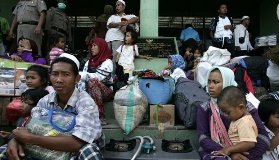(Ahlul Bayt News Agency) - For the first time in his life, Jawi, 42, a Shiite who was evicted from his hometown in Bluuran village in Sampang regency, Madura, East Java, is unable to fast in his home village.The father of four is being forced to observe Ramadhan at the Puspa Argo low-cost apartment complex in Jemundo district, Sidoarjo regency, located more than 100 kilometers from his village.Jawi longs for a sense of togetherness among Muslims during Ramadhan at home. He misses gathering with his neighbors in the evening after breaking the fast while waiting to perform the tarawih mass prayer.“I want to return to my home village but I don’t know how. I don’t have a home there as it was razed to the ground by a [Salafi] mob,” said Jawi.Members of the Shia minority group have been displaced for almost a year following a riot involving Shiites and an anti-Shia group in Sampang.Two Shiites were killed, while dozens of houses belonging to Shiites were burned down by a mob in the incident. The majority of Indonesians are Sunni Muslims.Jawi claimed that life used to be good in the village as he owned a cow and two goats. He used to grow tobacco, rice, corn and peanuts on his 2-hectare farm, the yields of which were adequate to support his family.“I could earn Rp 16 million [US$1,700] from selling tobacco. We consumed rice and corn and sold the peanuts,” said Jawi.Another Shiite, Zaini, 20, shared a similar thought, saying he missed hanging out with his friends in the evening during Ramadhan.“Now, it’s different. I feel so lonely here. We prefer to fast in our home village where it’s more relaxed and peaceful,” said Zaini.Another refugee, Siti Laila, 16, said she could no longer help her mother prepare the meal to break the fast. Laila yearned for the atmosphere in her village, where people exchanged food with one another prior to breaking the fast and there was no difference between Shia and non-Shia communities.“Everyone exchanged food. It was exciting during Ramadhan in the village,” said Laila.Since June 20, 64 displaced Shia families comprising 224 people have been living in the Puspa Agro low-cost apartments.They include five infants, 15 toddlers, 103 school-aged children, 90 adults and 9 elderly people over 60-years-old.Commission for Missing Persons and Victims of Violence (Kontras) Surabaya chapter coordinator Andy Irfan said the East Java provincial administration had not provided basic necessities for the displaced, such as food and nutrition according to their age groups, proper education and economic needs, like jobs for unemployed farmers./129
source : Jakarta Post
Sunday
14 July 2013
7:30:00 PM
440789

Since June 20, 64 displaced Shia families comprising 224 people have been living in the Puspa Agro low-cost apartments. They include five infants, 15 toddlers, 103 school-aged children, 90 adults and 9 elderly people over 60-years-old.
